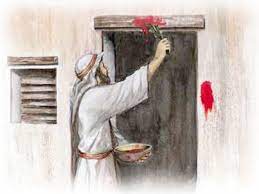
The story of the Exodus is one of the most powerful narratives in the Bible. At its heart lies the institution of the Passover. In Exodus 12:1-30, we find a detailed account of the original Passover, a defining moment for the people of Israel and a significant event in the broader context of God’s redemptive plan for humanity.
This blog post will delve into the passage, exploring its importance and how it symbolizes redemption. This redemption would come to the Israelites and all who would believe in the God of Abraham, Isaac, and Jacob.
Exodus 12:1-30: The Passover and the Exodus – A Pivotal Moment in God’s Redemptive Plan
The Historical Context of Exodus 12:1-30
The book of Exodus chronicles the Israelites’ deliverance from slavery in Egypt. By the time we reach chapter 12, God has already sent nine plagues upon Egypt, yet Pharaoh’s heart remains hardened. The tenth and final plague is about to unfold—the death of the firstborn in every Egyptian household. It is against this backdrop that God establishes the Passover.
The Institution of the Passover
Exodus 12:1-30 provides instructions for the Passover ritual. Each Israelite family is to take a year-old male lamb without blemish. They are to care for it, and then slaughter it at twilight on the fourteenth day of the month. They must take some of the blood and put it on the doorframes of their houses. That night, they are to eat the meat roasted over the fire, along with bitter herbs and bread made without yeast.
God explains that the blood on the houses will serve as a sign. When He sees the blood, He will “pass over” those homes during the plague. Thus, He will spare the Israelites from the death of the firstborn. This event is to be commemorated annually as a festival to the Lord.
The Fulfillment of the Passover
The Passover is rich in symbolism and foreshadowing. The unblemished lamb represents Christ, “the Lamb of God, who takes away the sin of the world” (John 1:29). The blood on the doorposts prefigures the blood of Christ, shed on the cross, which protects believers from eternal death. The bitter herbs symbolize the bitterness of slavery. Also, the unleavened bread symbolize the purity and haste of the Israelites’ escape from Egypt.
The Importance of Exodus 12:1-30
This passage is crucial for several reasons:
- Deliverance and Redemption: The Passover marks the beginning of the Israelites’ deliverance from slavery, symbolizing God’s saving power and His willingness to redeem His people.
- Judgment and Mercy: The plague demonstrates God’s judgment on the gods of Egypt and the hardness of Pharaoh’s heart, while the passing over of the Israelite homes shows His mercy towards those who obey Him.
- Covenant Relationship: The annual celebration of the Passover is a reminder of the covenant between God and Israel, a relationship that calls for remembrance and obedience.
- Theological Foreshadowing: The Passover lamb is a type of Christ, whose sacrifice would later bring about the ultimate redemption for all of humanity.
God’s Plan of Redemption Throughout History
The Passover is a foundational event in understanding God’s plan of redemption. It is a story that points forward to the greater story of salvation that unfolds throughout the Bible. The New Testament reveals that Jesus Christ is the true Passover Lamb, whose sacrifice on the cross fulfills the symbolism of the lamb slain in Egypt.
In 1 Corinthians 5:7, Paul explicitly identifies Christ as “our Passover lamb [who] has been sacrificed.” The Last Supper, which Jesus shared with His disciples before His crucifixion, was a Passover meal that He reinterpreted in light of His impending sacrifice. This establishes the link between the Old Testament Passover and the New Testament understanding of salvation through Jesus Christ.
Application for Today
Exodus 12:1-30 speaks to us today by reminding us of several key truths:
- God’s Sovereignty: God is sovereign over history, and His plans are unstoppable. The Exodus narrative assures us that God is working out His purposes, even when circumstances seem dire.
- The Need for Salvation: Just as the Israelites needed deliverance from physical slavery, we need deliverance from the slavery of sin. The Passover story points to our need for a savior.
- The Response of Faith: The Israelites had to act in faith by marking their doorposts with blood. Likewise, we must respond in faith to the sacrifice of Christ, allowing His blood to cover our lives and deliver us from death.
- The Continuity of God’s Plan: The story of the Passover is not just an ancient tale but a living narrative that continues to unfold. As Christians, we participate in this story every time we partake in the Lord’s Supper, remembering the sacrifice of Jesus, our Passover Lamb.
Conclusion
Exodus 12:1-30 is more than just a historical account; it is a profound theological statement about God’s redemptive work. The Passover event is a shadow of the substance found in Christ. As we reflect on this passage, we are reminded of the depth of God’s love. Next, we understand the immense cost of our freedom from bondage to sin. Then finally, the certain hope we have in the ultimate redemption that is found in Jesus Christ. The echoes of the Exodus story resound through the ages, calling us to embrace the redemption offered to us and to live as a people set free.